What Does Equivalent Mean in Sports?
When we talk about equivalent, a term that signals a level of similarity or parity between two things, often measured with data or outcomes. Also known as comparability, it helps fans, analysts and coaches decide if two teams, players or events line up on the same footing. In the world of sports news, understanding equivalence lets you quickly gauge whether a win probability, a draw result or a ban on merchandise truly lines up with past situations.
Key Areas Where Equivalence Shows Up
One hot spot for equivalence is football, the global game where win odds, goal counts and league positions are constantly compared across seasons. Whether you’re looking at Arsenal’s 78% win chance against West Ham or a 1‑1 MLS draw that sparked talk of Messi’s impact, the idea of “is this result equivalent to last year’s performance?” drives analysis. Another arena is team sports, any competition where groups of players cooperate toward a common goal, from hockey to relay races. Here, equivalence isn’t just about scores; it’s about tactics, player roles and even uniform policies, like the half‑and‑half scarf ban that tries to create a clear visual distinction between rival fans.
Statistics form the backbone of any equivalence claim. sports statistics, numerical data that track performance, health risks and fan engagement let you compare a player’s heart‑rate trends with sudden‑death incidents, or match attendance before and after a policy change. When a political shake‑up like Angela Rayner’s resignation shakes the broader sports funding conversation, analysts turn to data to see if the political climate is equivalent to previous election cycles. Meanwhile, sports news, the daily flow of reports, opinion pieces and breaking stories provides the narrative glue that ties those numbers together, helping readers decide if today’s headline really matches the weight of past events.
All these pieces—football odds, team‑sport policies, hard stats and the news cycle—interact like a web of equivalents. Knowing that a 78% win probability means “almost a sure thing” only works if you remember past matches with similar odds and how those turned out. Seeing a ban on mixed‑colour scarves makes sense when you compare fan incidents before and after similar restrictions. And spotting a sudden‑death case among fit athletes feels more alarming when you line it up with health screenings from previous seasons. Below you’ll find a curated mix of articles that dive into each of these angles, from match previews and draw analyses to policy debates and health warnings. Use the collection to see how the idea of “equivalent” plays out across real‑world sports scenarios, and pick up practical insights you can apply to your own fandom or analysis.
What is the Netflix equivalent of live sports?
The world of live sports is an exciting and thrilling experience that can't be replicated. But what if you could get a streaming experience that was the equivalent of live sports? Enter Netflix, the streaming service with an ever-growing library of sports-related content. From documentaries to original series, Netflix has something for everyone who loves sport. Whether you're looking for an in-depth look at the history of a sport or a high-octane competition series, Netflix has it all. So, if you're a fan of sports, but don't have the time to watch live games, Netflix is the perfect streaming service for you.
